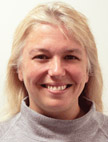The Silvio Conte Center for Neuroscience Research at Washington University in St. Louis has a new director. Deanna M. Barch, Ph.D., associate professor of psychology in Arts & Sciences, of psychiatry and of radiology, takes over leadership of the center from John G. Csernansky, M.D., the former Gregory B. Couch Professor of Psychiatry, who has become the chairman of psychiatry at Northwestern University.

Barch has been a close collaborator of Csernansky’s throughout the history of the Conte Center, which was established in 2001. It is one of a handful of such centers around the country created to honor former Massachusetts congressman Silvio O. Conte, a longtime advocate for scientific research. Prior to his death from cancer in 1991, Conte had sponsored the Congressional resolution that designated the 1990s as the “Decade of the Brain.”
The center, funded by the National Institute of Mental Health, coordinates and oversees several major brain-mapping projects that are attempting to locate and identify anatomical and functional differences in the brains of patients with schizophrenia.
In her new position, Barch will coordinate the activities of a group of neuroscience researchers using several methods to identify and study subtle structural and functional differences in the brains of people with schizophrenia and in their relatives, as well as animal models designed to elucidate the sources of these differences. The researchers use various types of MRI imaging, combined with very powerful computer programs, to look at the size and shape of several brain structures and the ways in which the brain responds during different types of memory and thinking tasks.
“A major component of our work in the Conte Center involves looking at what types of changes in brain structures, brain function and cognition may occur in schizophrenia, what types of changes may be present in the siblings of people with schizophrenia and which of those changes may predict who eventually will develop the illness,” Barch says. “The work may help us identify both risk factors for schizophrenia and factors that protect against the disease.”
The center also conducts research projects focused on evaluating treatments for memory and other cognitive problems that affect many people with schizophrenia, as well as research to better understand how changes in emotion, motivation and social interactions may influence the development and the course of the illness.
“Part of the center’s mission also involves community service and education,” Barch says. “So we’re not only publicizing our research projects to doctors and to families affected by schizophrenia but also to the community at large.”
To that end, the Conte Center will host a seminar at 1 p.m. April 12 at St. Charles Community College. The program, called “Helping Families Understand Schizophrenia and the Mental Health System,” is free and open to the public.
For more information on the seminar or to learn more about the research projects at the Conte Center, call Juanita Bishop at (314) 877-0756, or e-mail Juanita@conte.wustl.edu.
Washington University School of Medicine’s 2,100 employed and volunteer faculty physicians also are the medical staff of Barnes-Jewish and St. Louis Children’s Hospitals. The School of Medicine is one of the leading medical research, teaching, and patient care institutions in the nation, currently ranked third in the nation by U.S. News & World Report. Through its affiliations with Barnes-Jewish and St. Louis Children’s Hospitals, the School of Medicine is linked to BJC HealthCare.